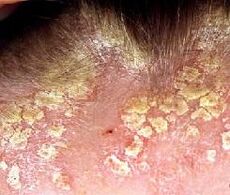
One of the most common forms of the disease is scalp psoriasis.
The disease itself is not an infection process, but the disease progresses in an inflammatory nature.
The symptoms of psoriasis are typical of fungal diseases-red or pink spots on the head, different shapes.
In addition to the formation of single or multiple rashes, itching, burning, and inflammation can also occur on the skin.
Causes of psoriasis
Why does psoriasis appear on the head and what is it? Doctors still don’t know why some people get scalp psoriasis. From time to time, doctors propose new theories and refute old theories. The cause of disease development is usually related to genetic susceptibility, and the factors leading to its appearance include:
- Genetic burden-It has been shown that among parents with psoriasis, the probability of having a child with this disease is an order of magnitude higher.
- According to one of the hypotheses, violation of the formation and maturation of epidermal cells is the main reason for the development of the disease.
- There is also a hypothesis that the cause is not the epidermis, but the body’s immunity, which creates the wrong factors that negatively affect the skin.
- According to some scientists, disorders of the endocrine system can also lead to the development of this disease.
At present, the most likely cause of the development of psoriasis is believed to be the autoimmune process in the patient's body.
Will your hair fall?
Patients with the disease are often interested in this question-can hair loss be observed in psoriasis? It should be noted that massive baldness will not occur. If such a process occurs, the number is trivial because the hair follicles are deep and the disease will not affect them.
Psoriasis contagious?
This fear is related to the unusual appearance and history of psoriasis. In ancient times, psoriasis was mistakenly regarded as a terrible leprosy. Judging from the above causes of psoriasis, it is obvious that the disease cannot be classified as infectious. Therefore, the answer to the question of whether it is possible to contract psoriasis is no.
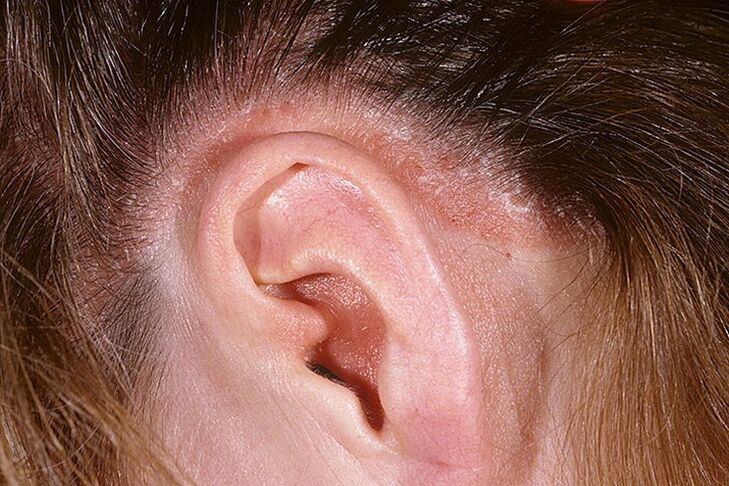
symptom
Scalp psoriasis is accompanied by a characteristic rash on the skin that appears as spots or, more commonly, patches that range from pale pink to brownish red. In most cases, the components of the rash range from the smallest palpable height above the level of healthy skin to a significant infiltration of more than 1 mm.
In the initial stage, only diffuse, without inflammatory manifestations and clear boundaries, massive peeling in the form of dandruff is possible. It is very similar to other skin diseases of the head, which makes the differential diagnosis and treatment of head psoriasis very complicated.
The most typical symptom of psoriasis is the "psoriatic crown"-this process transitions from the scalp to the smooth skin adjacent to the forehead, to the area above and behind the ears, to the back of the earlobe, the occiput and the back of the neckDepartment.
According to the size and severity of symptoms, the scalp has 3 degrees of damage:
- Simple-The main manifestation is the appearance of a small single lesion on the head covered with thin small scales;
- Heavy-Psoriasis completely affects the scalp, the scales are much larger, and much thicker than mild and severe diseases.
Clinical studies have shown that in most patients, there is no single factor that can explain the onset of the disease. In most cases, a combination of several of these causes is observed, which provides a basis for classifying psoriasis as a multi-cause disease.
The difference between psoriasis and seborrheic dermatitis
Signs of differential diagnosis of psoriasis and seborrheic dermatitis:
- In contrast to diabetes, psoriasis is characterized by a more pronounced infiltration of the components of the rash due to acanthosis and hyperproliferation of the epidermis.
- The rash of psoriasis usually extends beyond the scalp, forehead (the so-called "psoriatic crown"), neck and ears.
- The peeling of psoriasis is dry, and the scales of diabetes are more greasy.
- More pronounced itching is observed in diabetic patients.
It is also necessary to carefully examine and ask whether the patient has nail and joint damage. The presence of these damages may indicate the existence of psoriasis and significantly affect further treatment strategies.
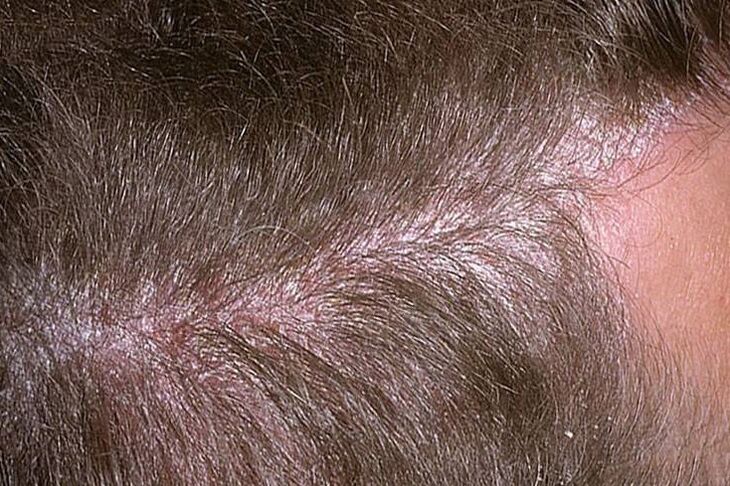
Scalp Psoriasis Treatment
When scalp psoriasis is diagnosed, a series of measures are used for treatment, including:
- General therapy
- Local treatment
- Physiotherapy procedures;
- Spa treatment.
In mild cases and no progression of scalp psoriasis, in most cases, prescribing topical medications is sufficient-shampoo, gel, ointment, tar, etc. At the same time, the treatment of the evolving inflammatory process may require the use of a wider range of pharmacological drugs and physical therapy techniques.
How to treat psoriasis with drugs?
In comprehensive treatment, the doctor may include the following drugs:
- Vitamin complex and vitamin C, A and B groups;
- Non-specific immunotherapy drugs: ATP, aloe;
- Aromatic Retinoic Acid;
- Cytostatics
- Hermodez solution;
- Intestinal adsorbent
- Monoclonal antibodies;
- Immunomodulator
- Antihistamines;
- NVPS;
- sedative;
- Calcification of autologous blood.
It is advisable to add corticosteroid drugs and cytostatics during treatment for severe psoriasis and severe scalp symptoms. They must be used very carefully: these funds may exacerbate the course of the disease.
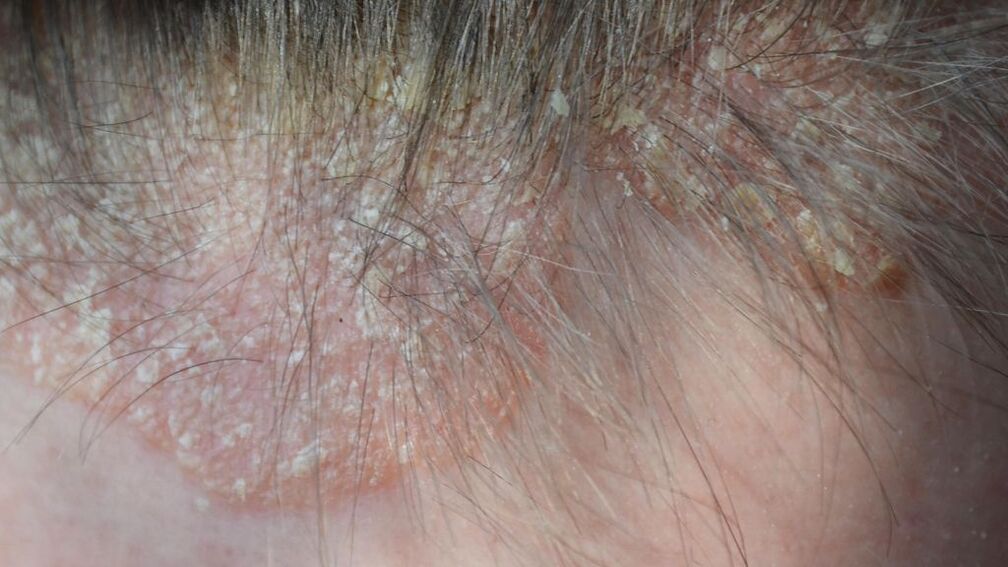
Scalp psoriasis shampoo
Is it possible to cure psoriasis on the scalp with shampoo? Usually, even using very effective shampoos is not enough. However, the use of special healing agents in combination therapy is a prerequisite for successful treatment.
All medicinal shampoos help reduce the inflammatory process and relieve or reduce itching, but using only one shampoo is not effective-the treatment must be comprehensive.
ointment
Local treatment always helps to increase the effectiveness of the medicine. In the advanced stage of psoriasis, 2% salicylic acid and boron salicyl alcohol ointment will be useful. If there is exudation and severe inflammation, you need to use corticosteroid-containing creams and ointments.
The non-hormonal ointment contains birch, pine, juniper and coal tar. They can be made into ointments and pastes.
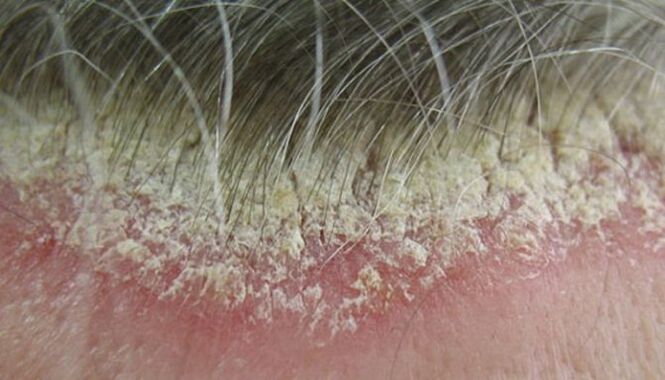
Diet for head psoriasis
Nutrition should be even. On the basis of "eat less, eat more", the portion of food should be small. The last meal should be no later than 19-00, and you can drink a glass of kefir or yogurt in the evening.
- It is necessary to give up alcoholic beverages altogether. Using them during remission can cause the condition to worsen.
- Fat, spicy and smoked foods should be excluded from the diet.
- It is also not recommended for sweets-cakes, pastries, chocolate, sugar-all of which should be banned for psoriasis. Only a small amount of honey is allowed.
Among the beverages, sea buckthorn tea, rose hip tea or black currant leaf tea will be useful.
Spa treatments
During the hospitalization, you must go through the following procedures:
- Sun therapy
- Mud therapy
- Hydrogen sulfide bath and hydrogen sulfide spring bath.
The treatment process takes place in special nursing homes, and they help reduce the frequency of relapses and achieve long-term remission.
PUVA therapy
PUVA therapy is a physical therapy method that involves the use of photosensitive drugs and irradiation of the skin with long-wave ultraviolet radiation.
A considerable amount of experience and expert reviews have proved the effectiveness of PUVA therapy in the treatment of various skin diseases (including psoriasis), especially when continuous processes and other treatments are ineffective. According to statistics, about 80-85% of cases have achieved positive results.
Hair care rules
In order to achieve a better condition of your hair and scalp, you need to follow the basic care rules and the doctor’s advice:
- Use only the recommended special shampoo to wash your hair.
- Comb your hair with natural bristles.
- Treat the scalp systematically with a disinfectant mixture.
- Comb your hair very gently without hurting your scalp.
- Try to dry your hair naturally without using a hair dryer.
- For head psoriasis, you need to avoid complicated styling that requires the use of various styling products.























